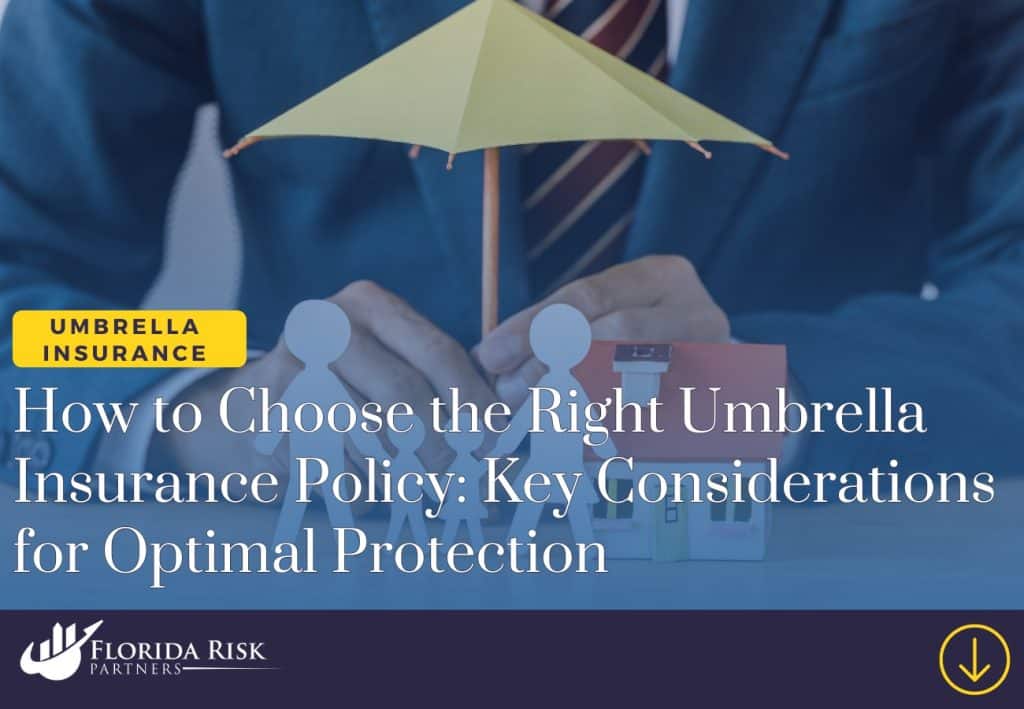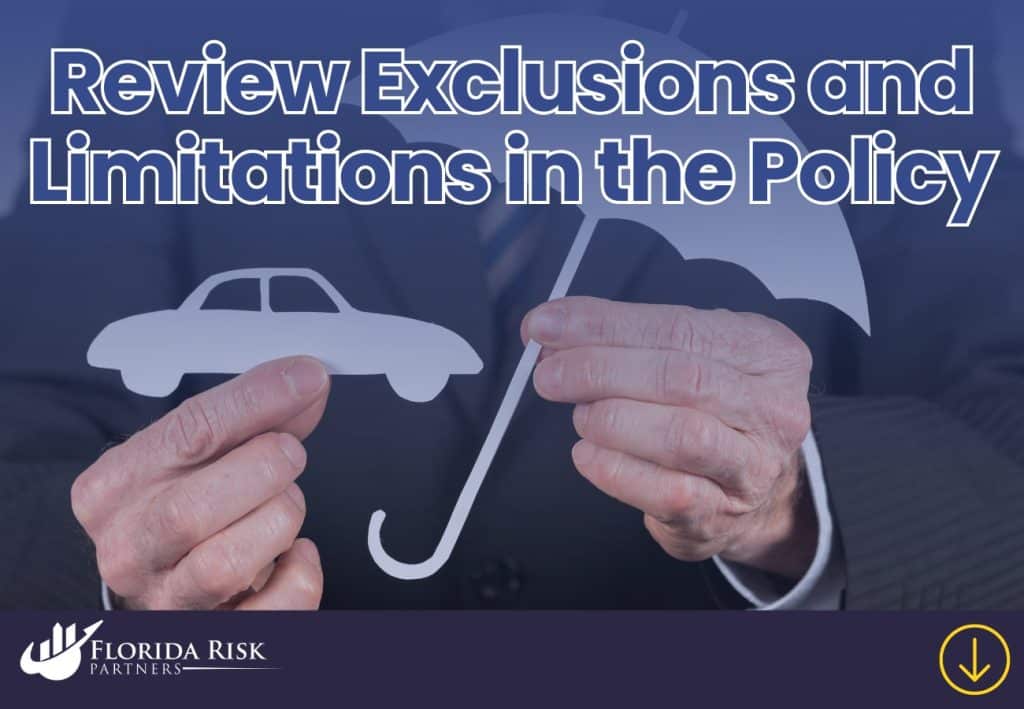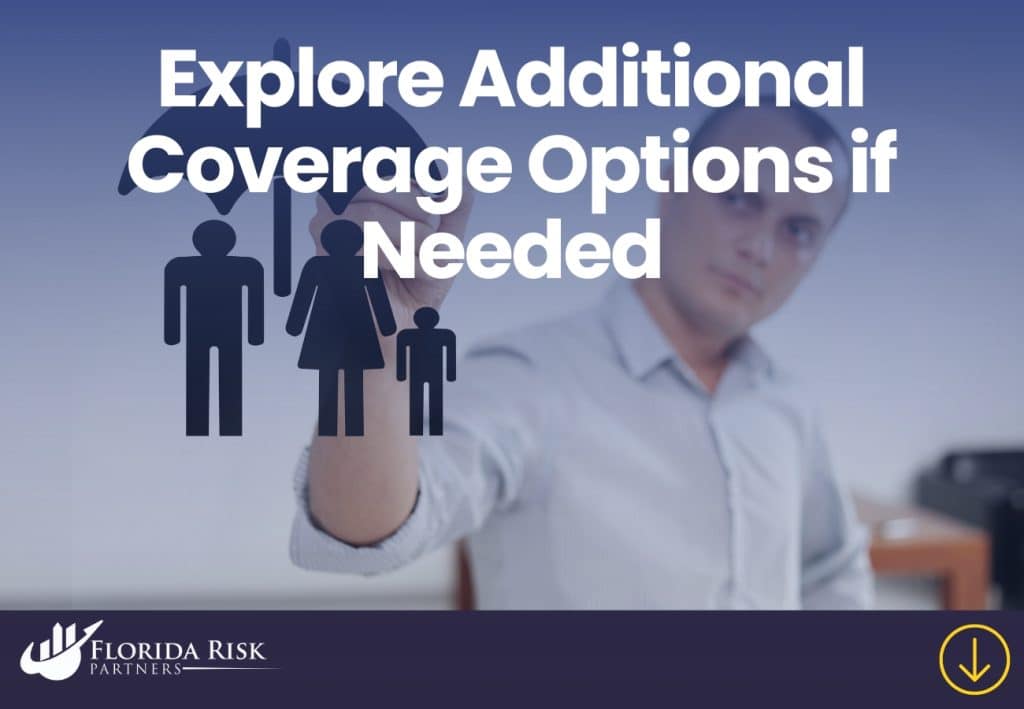-
Main Office: 1434 E. Bloomingdale Ave Valrico, FL 33596-6110
-
Phone: (888) 601-6660
-
Email: info@floridariskpartners.com

Selecting the right personal umbrella insurance policy can feel like a challenging task, especially with so many coverage options available. Umbrella insurance provides an essential layer of liability protection, covering costs that exceed the limits of your primary insurance policies, such as homeowners or auto insurance. But how do you know which policy is the right fit for your needs and financial situation?
In this guide, we’ll walk through the essential factors to consider when choosing the best umbrella insurance policy. By understanding key aspects such as coverage limits, exclusions, provider reputation, and more, you’ll be equipped to make an informed decision and select a policy that aligns with your unique needs.
Understanding the Basics of Umbrella Insurance
Before diving into the process of choosing an umbrella insurance policy, it’s helpful to review what umbrella insurance covers and how it works. Umbrella insurance is a liability policy designed to extend your coverage beyond the limits of your existing insurance, such as homeowners, renters, and auto policies. It provides additional financial protection in the event of large claims or lawsuits.
Umbrella insurance not only covers bodily injury and property damage but also provides coverage for certain personal injury claims not typically included in standard policies. This can include claims of defamation, slander, libel, and invasion of privacy. The coverage typically starts at $1 million and can increase in $1 million increments, depending on your provider and needs.
Key Factors to Consider When Choosing an Umbrella Insurance Policy
When selecting an umbrella insurance policy, several factors should guide your decision. Here are the key considerations to help you choose the best policy for your financial protection:
1. Determine Your Coverage Limit Needs
The amount of coverage you need depends on your assets, net worth, and level of liability exposure. Coverage limits for umbrella insurance typically start at $1 million, but depending on your situation, you may need more. Here’s how to evaluate your ideal coverage limit:
- Assess Your Assets: Calculate the total value of your assets, including your home, savings, investments, and any other valuables. This gives you a baseline for the amount of coverage you need to protect your net worth.
- Consider Your Income and Future Earnings: If you have high earning potential, umbrella insurance provides protection for your future income as well. This is crucial if a lawsuit could potentially lead to wage garnishment to satisfy a judgment.
- Evaluate Your Risk Factors: Certain factors, like owning rental properties, having teenage drivers in your household, or frequently hosting events, increase your liability exposure. If you’re at a higher risk for large claims, consider opting for a higher coverage limit, such as $2 million or $5 million.
2. Understand the Minimum Requirements for Primary Policies
Most insurance providers have minimum liability requirements on your primary policies to qualify for an umbrella policy. For example, you may be required to carry at least $300,000 in liability on your homeowners policy and $250,000 per person / $500,000 per accident on your auto policy.
If your existing policies don’t meet these minimums, you may need to increase your coverage, which could raise your premiums. Understanding these requirements in advance will help you make necessary adjustments to ensure you’re eligible for umbrella coverage.
3. Review Exclusions and Limitations in the Policy

While umbrella insurance offers broad coverage, it doesn’t cover every scenario. Reviewing exclusions and limitations is essential to know what’s included and what’s not. Here are some common exclusions in umbrella policies:
- Intentional Acts: Umbrella insurance won’t cover claims related to intentional harm or property damage.
- Business-Related Incidents: Personal umbrella policies don’t cover business liabilities, so if you’re a business owner, you’ll need a separate commercial umbrella policy.
- Certain Vehicles: Some policies exclude certain vehicles, like aircraft, or specific types of recreational watercraft.
- Contractual Liability: Claims arising from contracts or agreements you enter into may not be covered.
By reviewing these exclusions, you can better assess any additional coverage you might need and ensure your umbrella policy fits your unique circumstances.
4. Choose a Reputable Insurance Provider
The reputation and financial stability of your insurance provider is crucial, especially when it comes to paying out large claims. When researching providers, consider their financial ratings and customer service reputation. Companies like A.M. Best, Moody’s, and Standard & Poor’s provide ratings for insurers, helping you evaluate their financial stability.
In addition to financial strength, consider customer reviews and testimonials regarding claims handling. A provider with a reputation for responsive and fair claims processing will offer peace of mind, knowing you’ll have support if you ever need to file a claim.
5. Understand the Claims Process and Legal Defense Coverage
Legal defense costs can be substantial in a lawsuit, and one of the benefits of umbrella insurance is that it covers legal fees related to liability claims, even if you’re ultimately found not liable. Before choosing a policy, review the insurer’s approach to covering legal defense costs, including any limitations.
Some important questions to consider:
- Does the insurer cover legal defense costs outside the umbrella policy limit, or does it reduce the coverage amount?
- Are you free to choose your legal representation, or does the insurer assign an attorney?
- How responsive is the insurer’s claims team in handling complex cases?
Understanding these aspects will give you confidence in your coverage, ensuring you’re fully prepared if a liability claim arises.
6. Compare Costs and Premiums
While the cost of umbrella insurance is relatively affordable compared to the high coverage limits it provides, premiums can vary based on factors like location, lifestyle risks, and the amount of coverage. Most umbrella policies start at around $150 to $300 per year for $1 million in coverage, with each additional $1 million costing between $75 and $100.
When comparing premiums, be mindful of:
- Coverage Value vs. Premium Cost: Consider how much you’re paying in relation to the protection the policy offers. While it might be tempting to choose the cheapest policy, it’s crucial to ensure it provides adequate protection.
- Bundling Discounts: Some insurers offer discounts if you bundle umbrella insurance with other policies, like homeowners or auto insurance, which can make the premium more affordable.
- Risk-Based Pricing: Lifestyle factors, such as owning a swimming pool, having teenage drivers, or owning rental properties, can impact your premium. If these apply to you, consider the added value of the coverage compared to the extra cost.
7. Explore Additional Coverage Options if Needed
If you have unique liabilities or own assets that aren’t covered by a standard personal umbrella policy, consider adding endorsements or purchasing additional policies. Here are some situations where you may need additional coverage:
- Business Ownership: If you run a small business or home-based business, a personal umbrella policy may not cover business-related claims. In this case, a commercial umbrella policy will provide extra liability protection for your business activities.
- Unusual Vehicles: Some high-value or unique vehicles, like yachts or private airplanes, require specialized coverage. Check with your insurer to confirm what’s included and consider additional policies if necessary.
- High-Profile or Public Figure Status: Public figures or individuals with strong online presences may be at a higher risk for defamation, slander, or invasion of privacy claims. If this applies to you, ensure your umbrella policy includes personal injury liability or explore options for additional coverage.

The Benefits of Having the Right Umbrella Insurance Policy
Choosing the right umbrella insurance policy isn’t just about meeting minimum requirements—it’s about selecting a policy that aligns with your lifestyle, assets, and risk factors. Here’s how the right umbrella policy can benefit you:
Extensive Financial Protection
With the right amount of coverage, umbrella insurance protects you from the financial strain of large claims. Whether it’s a severe car accident, a guest injury on your property, or a defamation lawsuit, umbrella insurance ensures you’re not personally responsible for costs that exceed your primary policy limits.
Peace of Mind
Knowing that you’re covered for major liabilities provides peace of mind in everyday life. An umbrella policy covers unexpected events that could otherwise cause significant financial distress, allowing you to enjoy your assets and lifestyle without constant worry about liability exposure.
Coverage for Personal Injury Claims
Standard insurance policies often don’t cover personal injury claims for non-physical harm, such as libel, slander, and invasion of privacy. For individuals who are active on social media, work in public roles, or have high-profile jobs, the added personal injury coverage in an umbrella policy is invaluable.
Legal Defense Cost Coverage
Umbrella insurance covers legal defense costs, even if you’re not liable. It protects you from significant legal fees, ensuring you’re not financially burdened by court expenses.
Affordable High-Value Protection
Umbrella insurance offers extensive protection and is highly cost-effective. For a low premium, it provides millions in liability coverage, securing your financial future and making it a smart investment.
How to Get Started with Your Umbrella Insurance Policy
Once you’ve considered the key factors and decided on a coverage amount, getting started with an umbrella insurance policy is straightforward. Here’s a step-by-step guide:
- Contact Your Insurance Agent: Reach out to your current insurance provider or a trusted insurance agent to discuss your umbrella insurance options. Many providers offer umbrella policies as an add-on to existing policies, which may qualify you for bundling discounts.
- Review Your Primary Policies: Check the liability limits on your homeowners, auto, and other primary policies to ensure they meet the umbrella policy’s minimum requirements.
- Compare Quotes and Policy Options: Obtain quotes from multiple insurers and compare the coverage details, exclusions, premiums, and bundling discounts to find the best option.
- Read the Fine Print: Review the policy carefully, paying close attention to exclusions, legal defense provisions, and any requirements that could affect your coverage.
- Purchase and Integrate Your Policy: Once you’ve selected a policy, your insurance agent will help you integrate it with your existing policies, ensuring seamless coverage.
Final Thoughts: Choose the Right Umbrella Insurance for Peace of Mind
Protecting your financial future starts with the right umbrella insurance policy. Evaluate your assets, lifestyle, earning potential, and risks to choose the ideal coverage. This ensures comprehensive protection and peace of mind.
If you’re interested in learning more about personal umbrella insurance, download our free e-book for a complete guide on coverage, scenarios, and choosing the right policy.
Get a free copy of our comprehensive guide to personal umbrella insurance
Investing in the right umbrella insurance policy ensures that you’re prepared for life’s unexpected events, providing peace of mind and financial security for you and your family.
Call Us Or
Schedule an Appointment
Select an agent below to view our online calendars and select a day and time that works best for you or call us directly at 888-601-6660. When you use our online calendars, you will receive an email with more information.



